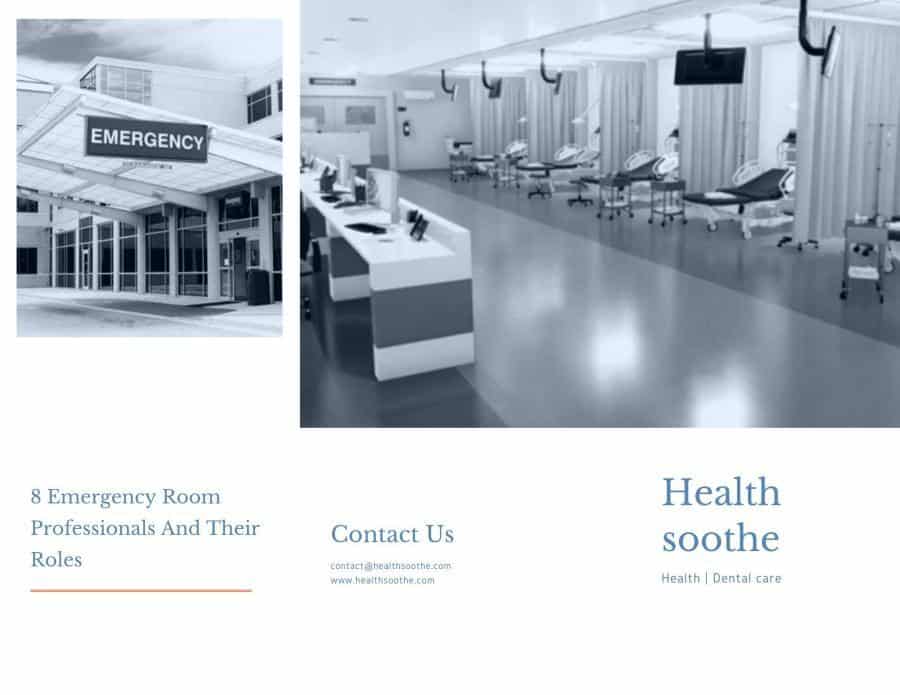8 Emergency Room Professionals And Their Roles
Hospitals, clinics, and medical service providers operate due to the contribution of many people rendering their professional, life-saving services. These include doctors, nurses, cleaners, receptionists, and many others. Moreover, there are numerous professionals with jobs that many would consider as relatively behind the scenes. Some examples of these are the essential jobs of the people working in the emergency room.
Generally, emergency rooms (ERs) play a crucial role in providing quality medical services to patients who need immediate medical attention. Like other hospital departments, ERs can be considered a critical area due to their constant influx of incoming patients suffering from various health issues, including injuries. Since they serve as the first point of contact, they should be equipped with not just state-of-the-art medical tools and equipment but also competent medical practitioners who can deliver timely and good quality emergency care services to patients.
Essentially, emergency room professionals are medical service professionals who specialize in caring for patients in the emergency ward. The state of an emergency room can range from relatively calm to highly chaotic depending on the rate of medical emergencies or the state of each patient upon arrival. The professionals that work in this environment are conscious of how to carry themselves and work in such conditions.
Read on to learn more about the different types of emergency room professionals and their roles.
1. Triage Nurse
Usually, when you enter the emergency room after being transported by your personal vehicle or by the ambulance paramedics, your first point of contact is a triage nurse. A triage nurse is a specialist nurse assigned to the emergency room who carries out an assessment on the depth of your injuries or your sickness. They help facilitate patient flow within the emergency room. Sometimes, a triage nurse may even perform some minor emergency treatments.
Moreover, a triage nurse assigned in the emergency room is also responsible for reducing the waiting times of the patients and arranging patient care with other hospital departments and the transportation that they need to get there as quickly as possible.
2. Emergency Physician
An emergency physician, also referred to as an emergency room doctor in certain places, is a physician who attends to ill or injured patients in the emergency room. They’re usually senior specialists who specialize in trauma care, soft tissue injuries, resuscitation, and advanced cardiac life support. They’re also often the first point of contact when it comes to the management of various life-threatening situations.
Despite their specialization in various medical realms, sometimes they may just revert to the management side of things in the emergency room and refer the patient to other emergency room professionals.
3. Nurse Practitioners
Nurse practitioners are senior specialist nurses that work in the emergency room. They help further assess certain conditions and, at times, assist with the patients’ treatment. Their role is to assist in enhancing various specialized medical services and carry out essential clinical procedures depending on the situation at hand. They help provide nursing care services before and after the patient has been treated in the emergency room.
Essentially, nurse practitioners help deliver primary care in the emergency room. These can include ordering diagnostic tests, prescribing medications, performing bedside procedures, like central line access and suturing, assessing for risk factors to treatment, and educating patients with chronic diseases about the significance of certain lifestyle changes.
4. Allied Health Professionals
The emergency room is the site of numerous critical situations involving people with severe medical conditions. This is why allied health professionals are an important part of the emergency room. Allied health professionals include physiotherapists, emergency room pharmacists, and occupational therapists. These specialists are available to help with the patients’ treatment and help ensure that they get the help they need when they need it.
5. Mental Health Emergency Care
In the emergency room, there could be a team of mental health care professionals ready to serve in various capacities. People who go through the emergency room often experience problems involving their mental health. So, to conduct a sufficiently thorough emergency assessment, a mental health emergency care team is available. In addition to conducting mental health assessments, they review whether the patients are experiencing episodes of their previous diagnosis or are showing signs of the development of a new illness.
6. Radiographers And Radiologists
Patients brought to the emergency room often need to have an emergency scan or x-ray. Radiographers and radiologists work with other professionals in the emergency room to help identify injuries. They also help identify illnesses and assist in the diagnosis of the patients. Radiographers, sonographers, or radiologists may use x-rays, ultrasounds, computerized tomography (CT) scans, or magnetic resonance imaging (MRI) scans to assist in diagnosing and treating the patients. These specialists, along with pathologists, may carry out health screening as well if they deem it necessary.
Given the importance of their work in the diagnosing and treating of patients’ diseases, most radiographers, radiologists, and other medical professionals in the emergency room are well-trained to perform imaging scans on patients. Aside from their education program, they also take live courses and other training programs to equip them with more knowledge that can help their diagnostic capabilities. For example, emergency room professionals responsible for ultrasound examinations undertake emergency ultrasound training programs to optimize diagnosis and patient care.
Thus, if you’re a medical practitioner who operates the ultrasound machine and other imaging equipment in the ER, browse through the internet to learn more about ultrasound systems through a clinically-focused training program.
7. Administrative Staff
The administrative staff is part of the support professionals in the emergency room. Their role is to ensure that all your personal details are recorded and present. They manage any administrative tasks associated with your visit. Sometimes, they also help obtain any important patient history that could be valuable for a person’s diagnosis. Administrative staff also contact various family members or next of kin if necessary.
8. Emergency Registrar
An emergency registrar is typically a senior doctor working towards becoming a specialist or physician. Their role is to provide support to junior medical staff, rapidly assess and stabilize patients, and assist the senior physician with treatment.
Learn More About The Emergency Room
You may have been aware of some of the mentioned emergency room professionals and their roles. However, there could be some that you’re hearing of for the first time. Being aware of these roles can help you familiarize yourself with the emergency room setting. This could allow you to be more informed in case you find yourself in a situation where you or a loved one has to be in the emergency room.





